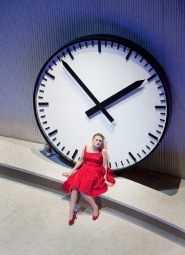Review: La Traviata
 The Metropolitan Opera’s determination to dust off its cobwebs is in further evidence with its new production of Verdi’s 1853 masterwork La Traviata. Willy Decker’s modernistic staging, which premiered to great acclaim five years ago at the Salzburg Festival, couldn’t be more different from the lavish Franco Zeffirelli warhorse it has replaced.
The Metropolitan Opera’s determination to dust off its cobwebs is in further evidence with its new production of Verdi’s 1853 masterwork La Traviata. Willy Decker’s modernistic staging, which premiered to great acclaim five years ago at the Salzburg Festival, couldn’t be more different from the lavish Franco Zeffirelli warhorse it has replaced.
Featuring a sterling dramatic and musical performance by Russian soprano Marina Poplavskaya in her Met debut, the production is a highly visceral and theatrical rendition that emphasizes the work’s emotional complexities in often striking fashion.
Performed on a mostly bare set dominated by a massive curving white wall and a giant clock that all too symbolically emphasizes the short time the Parisian courtesan Violetta has left to live, the staging will no doubt provoke the usual debate between traditionalists and those who want the Met to go off in new directions.
The work is performed in modern dress, in accordance with the composer’s (unfulfilled) wish that it not be performed as a period piece. In the first act party scene, Violetta is clad in a glamorous red cocktail dress, while the male characters are in dark business suits.
The director has choreographed the production with exacting detail, often positioning the massive Met chorus in stylized fashion, such as when they peer over the wall overlooking on the action as if an overpopulated Greek chorus.
There are other striking touches. The heretofore minor character of Doctor Grenvil (Luigi Roni) now hovers nearly constantly on the stage as a visual representation of Violetta’s impending doom. When her lover Alfredo (Matthew Polenzani) angrily confronts her, he doesn’t throw money at her feet but rather stuffs it into her cleavage and up her skirt. And Alfredo’s confrontation with his father (Andrzej Dobber) turns physical, culminating in a slap that sends the young man reeling to the floor. There is no intermission between the second and third acts, with the result that the evening’s second half (or more accurately, two thirds) possesses a strong dramatic momentum.
Although she has to strain at times to reach her high notes, Poplavskaya delivers a powerful vocal turn, and certainly cuts a dramatic and sexy figure. Polenzani handles his romantic arias beautifully, and Dobber sings and acts superbly in the powerful scene in which the father asks Violetta to abandon his son.
The directorial conceits thankfully never become oppressive, although at times there is a distracting self-consciousness to the proceedings. But whatever the flaws or merits of this production, it’s hard not to admire the Met’s willingness to take chances on even its most cherished staples.
Metropolitan Opera House at Lincoln Center
212-239-6200
| Print article | This entry was posted by Frank on 01/10/11 at 05:34:35 am . Follow any responses to this post through RSS 2.0. |